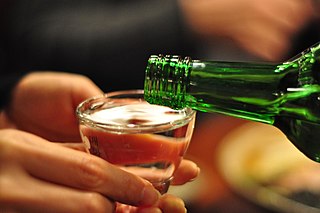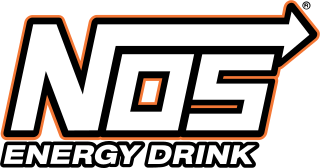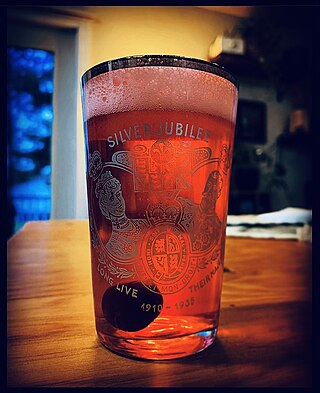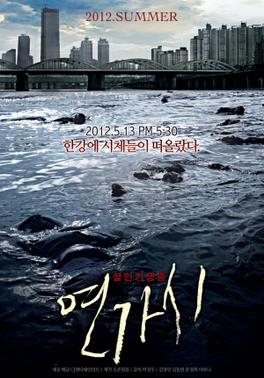
Red Bull is a brand of energy drinks created and owned by the Austrian company Red Bull GmbH. With a market share of 43%, it is the most popular energy drink brand as of 2020, and the third most valuable soft drink brand, behind Coca-Cola and Pepsi. Sinсe its launch in 1987, more than 100 billion cans of Red Bull have been sold worldwide, including over 12 billion in 2023.

Taurine, or 2-aminoethanesulfonic acid, is a non-proteinogenic naturally occurring amino sulfonic acid that is widely distributed in animal tissues. It is a major constituent of bile and can be found in the large intestine, and accounts for up to 0.1% of total human body weight.

Jolt Cola was a carbonated soft drink produced by The Jolt Company, Inc.. The cola drink was created in 1985 by C. J. Rapp as a highly caffeinated beverage. It was targeted towards students and young professionals, stressing its use as a stimulant in a similar manner as energy drinks. Its slogan reads "All the sugar and twice the caffeine!"

Soju is a clear and colorless distilled alcoholic beverage, traditionally made from rice, but later from other grains and has a flavor similar to vodka. It is usually consumed neat. Its alcohol content varies from about 12.5% to 53% alcohol by volume (ABV), although since 2007 low alcohol soju below 20% has become more popular.

The martini is a cocktail made with gin and vermouth, and garnished with an olive and/or a lemon twist. Over the years, the martini has become one of the best-known mixed alcoholic beverages. A common variation, the vodka martini, uses vodka instead of gin for the cocktail's base spirit.

An energy drink is a type of functional beverage containing stimulant compounds, usually caffeine, which is marketed as providing mental and physical stimulation. They may or may not be carbonated and may also contain sugar, other sweeteners, or herbal extracts, among numerous other possible ingredients.

An elixir is a sweet liquid used for medical purposes, to be taken orally and intended to cure one's illness. When used as a pharmaceutical preparation, an elixir contains at least one active ingredient designed to be taken orally.

TCP is a mild antiseptic, produced in France by Laboratoires Chemineau in Vouvray and sold in the United Kingdom by Omega Pharma.

Lipovitan, marketed in some English-speaking countries under the name Libogen and Livita, is an energy drink manufactured by Taisho Pharmaceutical Co. and its licensee Osotspa. Widely available in Asia, it retails in brown-colored translucent 100 ml bottles and has a distinctive bright yellow color. Lipovitan is marketed to alleviate physical and mental fatigue.

Tab Energy was a low calorie energy drink created by The Coca-Cola Company. The beverage is unique as it is sweetened with sucralose, it has a translucent pink color, and is lightly carbonated.

Krating Daeng is a non-carbonated energy drink created by Chaleo Yoovidhya. The drink is marketed and sold primarily in Southeast and East Asia; its derivative, Red Bull, is available worldwide in 165 countries.

Four Loko is a line of alcoholic beverages sold by Phusion Projects of Chicago, Illinois, United States. Four Loko's recipe formerly included caffeine. Phusion operates as Drink Four Brewing Company. Four Loko, the company's most popular beverage, debuted in the United States market in 2005 and is available in 49 states, and in 21 countries including Ecuador, Guatemala, Paraguay, The Bahamas, Peru, Mexico, Colombia, Bolivia, Honduras, El Salvador, Nicaragua, Costa Rica, China, Canada and some countries in Europe. The name "Four" is derived from the original drink having four "key ingredients".

NOS is an energy drink sold in 16-and-24-US-fluid-ounce cans. The drink was also distributed in a bottle designed to look like a NOS tank but this bottle has been discontinued. Formerly a property of the Coca-Cola Company, it is currently produced by Monster Beverage and licensed by Holley Performance, which owns the trademark. NOS contains 160 mg of caffeine, with an unknown amount of taurine and guarana. L-Theanine was removed as a "CMPLX6" ingredient in 2016, with inositol becoming listed as one of the six featured ingredients on the can. NOS Energy is currently available in Original, GT Grape, and Sonic Sour.

A beer cocktail is a cocktail that is made by mixing beer with other ingredients or another style of beer. In this type of cocktail, the primary ingredient is usually beer.
Mother is an energy drink that originated in Australia and New Zealand by Coca-Cola. Introduced in late 2006 after Coca-Cola's failed attempt to purchase Red Bull, it competes with the two leading energy drinks on the market, V and Red Bull, in the $151 million industry.

Emerge is a carbonated mixed-fruit flavour energy drink from the United Kingdom which contains taurine and caffeine. It is produced by the Cott Corporation at their packaging facility at Kegworth in Leicestershire. It is sold in Sainsburys, Asda, Poundland, Home Bargains and other retailers, usually newsagents. Its primary difference from competing brand-name energy drinks such as Red Bull and Relentless is the comparatively lower RRP of between 59p and 75p. It can often be found at a lower price than this, for example in pound shops or more recently, for loyalty card prices.

A Bloody Mary is a cocktail containing vodka, tomato juice, and other spices and flavorings including Worcestershire sauce, hot sauces, garlic, herbs, horseradish, celery, olives, pickled vegetables, salt, black pepper, lemon juice, lime juice and celery salt. Some versions of the drink, such as the "surf 'n turf" Bloody Mary, include shrimp and bacon as garnishes. In the United States, it is usually consumed in the morning or early afternoon, and is popular as a hangover cure.

A polar bear, After Eight or Peppermint Paddy is a mint chocolate cocktail that tastes like a York Peppermint Pattie or an After Eight mint. It is usually made from crème de cacao and peppermint schnapps, although crème de menthe is a popular substitute.

Deranged (Korean: 연가시) is a 2012 South Korean medical disaster thriller film starring Kim Myung-min, Kim Dong-wan, Moon Jung-hee and Lee Hanee. It is Korea's first medical thriller on an infectious disease epidemic. The film was directed by Park Jung-woo and produced by Lim Ji-young and Oz One Film. Distributed by CJ E&M, the film was released on July 5, 2012, and runs at 109 minutes.

Bacchus Ladies is a term to describe elderly female prostitutes in Seoul, South Korea.




















